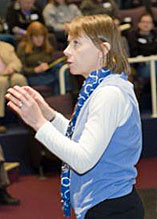Aram Calhoun
Media Expertise:
- Wetland Ecology, Policy, and Conservation
- Locally driven conservation planning
- Herpetology
Research Interests
- Wetland policy and conservation
- Vernal Pools
- Sustainability Science
- Human dimensions of natural resource conservation
Research Projects
- Localist approaches to wetland conservation
- Sustainability solutions through transdisciplinary collaboratives
Resources:
- Presentation – 2017 Maine Sustainability & Water Conference
- Talk – Conserving Small Natural Features with Large Ecological Importance (Vimeo)
- Website – Of Pools and People
Degrees:
- University of Maine, Ph.D. (Plant Biology and Microbial Ecology)
- University of Rhode Island, M.S. (Natural Resources Science and Wetland Ecology)
- Rhode Island College, M.A. (Education)
- Brown University, A.B. (American Civilization)
Courses
- Graduate short-courses on conservation planning and facilitation and emerging issues in conservation biology
Profile
Aram Calhoun is a wetland ecologist and faculty member at the University of Maine. Her research focuses on wetland ecology and policy and vernal pool conservation. Her work stresses the importance of conserving natural resources (wetlands and vernal pools) and/or target species (wood frogs, spotted salamanders, and blue-spotted salamanders) on private lands by addressing both human and ecological dimensions.
Calhoun’s research with the Mitchell Center uses local vernal pool conservation as a model to help communities find ways to balance economic development with natural resource conservation on private land. One aspect of Calhoun’s research is working with two Maine towns on conservation solutions that involve multiple levels of government, diverse state agencies and private interests for the conservation of vernal pools. Her work also involves working with the Environment and Natural Resources Committee of the State Legislature on the importance of wetland and vernal pool protection.
Calhoun’s research has been funded in large part by the U.S. Environmental Protection Agency, National Science Foundation, Maine EPSCoR, and the Senator George J. Mitchell Center. She has published in multiple peer-reviewed journals including Proceedings of the Natural Academy of Science, Ecology, Biological Conservation, Forest Ecology and Management, Freshwater Biology, Society and Natural Resources, and Wetlands.
Selected Publications
Mushet, D.M., and Calhoun, A.J.K., in press, Wetland conservation in the United States: a swinging pendulum. Pages XXX — XXX in Delgado, J., (ed) Soil and Water Conservation: A Celebration of 75 Years. Soil and Water Conservation Society Special Publication.
Boix, D., Calhoun, A.J.K., Mushet, D. M., Bell, K.P., Fitzsimons, J.A., Isselin-Nondedeu, F. 2020. Conservation of Temporary Wetlands. In: Encyclopedia of the World’s Biomes (eds Michael I. Goldstein and Dominik A. DellaSala), pp. 279-294.
Jansujwicz, J.S., Calhoun, A.J.K., Bieluch, K.H. et al. Localism “Reimagined”: Building a Robust Localist Paradigm for Overcoming Emerging Conservation Challenges. Environmental Management (2020). https://doi.org/10.1007/s00267-020-01392-4
Eakin, C., A.J.K. Calhoun, and M. Hunter, Jr. 2019. Indicators of wood frog condition in a suburbanizing landscape. Ecosphere 10. 10.1002/ecs2.2789.
Eakin, C.J., Hunter, J.M., & Calhoun, A.J. 2019. The influence of land cover and within-pool characteristics on larval, froglet, and adult wood frogs along a rural to suburban gradient. Urban Ecosystems 22:493-505.
Levesque V., AJK Calhoun, and E. Hertz. 2019 Vernal pool conservation: Innovative approaches to using and enhancing existing policy tools. Case Studies in the Environment. Article ID: CSE-2018-001636
Levesque, V., AJK Calhoun, and KP Bell. 2019. Actions speak louder than words: Designing transdisciplinary approaches to enact solutions. Journal of Environmental Studies and Sciences 9: 1029-1041.
Hoffmann, K., M. Hunter, Jr., A.J.K. Calhoun, and J. Bogart 2018. Post-breeding migration and habitat of unisexual salamanders in Maine, USA. Journal of Herpetology 52:273-281
Jansujwicz, J. S. and A.J.K. Calhoun. 2017. Community-based Strategies for Strengthening Science and Influencing Policy: Vernal Pool Initiatives in Maine. Maine Policy Review 26: 33-42
Creed, I.F. 2017. IF. Creed; CR. Lane; J N. Serran; LC. Alexander ;NB. Basu, AJ.K. Calhoun;J R. Christensen, M J. Cohen, C Craft, E D’Amico, E DeKeyser, L Fowler; H E. Golden, J W. Jawitz, P Kalla; L. K Kirkman, M Lang, S G. Leibowitz, DB. Lewis, J Marton, D L. McLaughlin, H Raanan-Kiperwas, M C. Rains, K C. Rains and L. Smith . Enhancing protections for vulnerable waters. Nature Geoscience 10:809–815.
Calhoun, AJK, D. Mushet, LC Alexander, E.S.Dekeyser,L. Fowler,C.R.Lane, M.W.Lang, MC Rains,SC Richter,and SC Walls. 2017. The significant surface-water connectivity of “Geographically Isolated” Wetlands. DOI 10.1007/s13157-017-0887-3.
Calhoun AJK, Mushet DM, Bell KP, Boix D, Fizsimons JA, Isselin-Nondedeu F. 2017. Temporary wetlands: challenges and solutions for protecting a “disappearing” ecosystem. Biological Conservation 211:3-11.
Cohen, M.J., I.F. Creed, L. Alexander, N.B. Basu, A.J.K. Calhoun, et al. 2016. Do geographically isolated wetlands influence landscape functions? Proceedings of the National Academy of Sciences 113:1978-1986.
Levesque, V., A.J.K. Calhoun, and K.P. Bell. 2016. Turning contention into collaboration: Engaging power, trust, and learning in collaborative networks. Society and Natural Resources.
Levesque, V.R., K.P. Bell, and A.J.K. Calhoun. 2016. Planning for sustainability in small municipalities: The influence of interest groups, growth patterns, and institutional characteristics. Journal of Planning Education and Research.
Groff, L.A., A.J.K. Calhoun, and C. Loftin.. 2016 . Hibernal ecology and habitat selection of wood frogs (Lithobates sylvaticus) in a northern New England montane landscape. Journal of herpetology.
Mushet, D.M., A.J.K. Calhoun, L.C. Alexander, et al. 2015. Geographically isolated wetlands: Rethinking a misnomer. Wetlands 35:423-431

